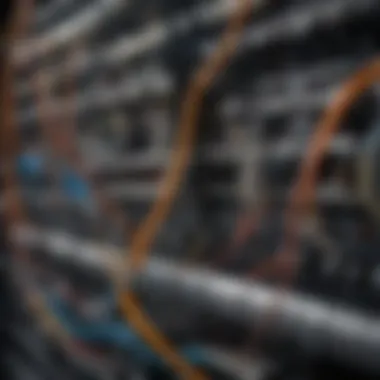Unveiling the Intricacies of ATT Fiber Installation Costs: A Comprehensive Analysis


Product Overview
Delving into the realm of ATT fiber installation cost unveils a complex tapestry interwoven with various financial components. From dissecting labor expenses to scrutinizing equipment charges, every facet contributes to the pricing structure of this intricate process. As we embark on this enlightening journey, we aim to shed light on the opaque layers surrounding the financial intricacies of ATT fiber installation.
Performance and User Experience
Analyzing the performance metrics of ATT fiber installation encompasses a meticulous evaluation of speed, multitasking capabilities, and the impact on overall user experience. Beyond the technicalities, understanding the nuances of user interface, ease of use, and gathering feedback and opinions adds a human touch to the otherwise technical discourse surrounding ATT fiber installation cost.
Design and Build Quality
Unveiling the design and build quality aspects of ATT fiber installation unearths a symphony of elements ranging from aesthetic appeal to the materials utilized in its construction. Assessing the durability and overall build quality offers a holistic perspective on the tangible aspects that underpin the financial investment required for ATT fiber installation.
Software and Updates
Navigating the realm of ATT fiber installation from a software perspective involves delving into the operating system features, frequent updates, and app compatibility. Moreover, exploring user customization options paints a vivid picture of the interactive dimension that augments the monetary considerations associated with ATT fiber installation cost.
Price and Value Proposition
The essential discourse on ATT fiber installation cost is incomplete without a nuanced exploration of its price positioning and perceived value proposition. Through a comparative analysis with similar products in the market, unraveling the relative benefits of different variants offers valuable insights into the financial landscape of ATT fiber installation.
Understanding ATT Fiber Installation Cost
In today's digital landscape, understanding the intricacies of ATT fiber installation cost is paramount for individuals seeking reliable and efficient internet connectivity. Dive deep into the financial aspects associated with ATT fiber installation, from labor expenses to equipment charges, to gain a comprehensive overview of the investment involved in upgrading to fiber-optic technology.
Initial Cost Components
When delving into the initial cost components of ATT fiber installation, it is crucial to dissect the significant factors contributing to the overall expenditure. This includes labor charges, equipment costs, and various fees and permits necessary for a seamless installation process.
Labor Charges
Labor charges play a pivotal role in the total cost of installing ATT fiber. Understanding the nuances of labor expenses is essential as it encapsulates the skilled workforce required to execute a successful installation. The intricacy of labor charges lies in the specialized expertise needed to handle fiber-optic materials and ensure precise connections, making it a critical component in the installation process.
Equipment Costs
Equipment costs constitute another essential aspect of ATT fiber installation expenses. From fiber optic cables to modems and installation tools, each equipment type comes with its own price tag contributing to the overall investment. Analyzing equipment costs allows individuals to make informed decisions regarding the procurement of necessary tools for a seamless installation process.
Fees and Permits


Navigating through the various fees and permits associated with ATT fiber installation is vital to budget planning. Installation fees, activation charges, and subscription costs all add up to the total expenditure. Understanding the fee structures and permit acquisition process can help individuals streamline their financial resources and adhere to regulatory requirements effectively.
Factors Influencing Cost
Several factors influence the overall cost of ATT fiber installation, shaping the financial commitment required for a successful setup. Location, installation complexity, and the availability of additional services all play a significant role in determining the final investment.
Location
The geographical location of the installation site impacts the cost due to varying terrain and accessibility factors. Urban and rural settings may require different approaches, influencing the overall expenditure. Understanding how location affects cost is crucial in estimating the financial implications accurately.
Installation Complexity
The complexity of the installation process directly correlates with the cost involved. Intricate setups or specialized requirements may incur additional charges, reflecting the technical expertise and resource allocation necessary for a successful installation. Evaluating installation complexity enables individuals to prepare financially for any potential challenges.
Additional Services
Opting for additional services such as maintenance packages or technical support can impact the overall cost of ATT fiber installation. While these services enhance the user experience, they also come with an added financial burden. Assessing the value of supplementary services is essential in determining the complete investment needed for a seamless fiber-optic setup.
Comparative Analysis
Conducting a comparative analysis between ATT and other service providers sheds light on the unique offerings and competitive advantages within the market. Exploring the differences in package customization and overall service quality aids individuals in making informed decisions regarding their internet service provider.
ATT vs. Other Providers
Comparing ATT with other providers allows for a comprehensive understanding of the service offerings, pricing structures, and overall customer satisfaction levels. Unveiling the intricacies of each provider's approach to fiber installation enables customers to weigh the pros and cons, facilitating an informed choice based on their specific requirements.
Package Customization Impact
The ability to customize packages according to individual needs is a significant factor influencing cost and service quality. Examining how package customization impacts the overall installation cost provides insights into the flexibility and scalability of service options offered by ATT and other providers in the market. Understanding the implications of tailored packages empowers consumers to tailor their internet solutions according to their preferences and budget constraints.
Evaluating Labor Charges
In the realm of ATT fiber installation cost analysis, understanding labor charges is pivotal. Labor costs form a significant component of the total expense incurred in setting up ATT fiber services. Deciphering the nuances of labor charges sheds light on the intricate web of financial considerations involved in this process, offering valuable insights into the allocation of resources and budgeting strategies.
Labor Cost Determinants
Hourly Rates


Hourly rates play a paramount role in the evaluation of labor charges for ATT fiber installation. The hourly rates designated by service providers directly impact the overall cost structure. By delving into the specifics of hourly rates, one can comprehend the breakdown of expenses and make informed decisions regarding budget allocations. The flexibility and transparency offered by hourly rates enable consumers to gauge the cost-effectiveness of the installation process efficiently.
Skill Levels
Skill levels constitute another critical factor influencing labor charges during ATT fiber installation. The expertise and proficiency of technicians directly correlate with service quality and, subsequently, cost considerations. Understanding the significance of skill levels allows consumers to assess the level of service expected and rationalize the associated expenses. Navigating through the realm of skill levels facilitates an informed decision-making process, ensuring optimal resource utilization.
Installation Timeframe
The installation timeframe is a key element shaping labor charges in ATT fiber setup. The duration required to complete the installation directly influences labor costs, making it imperative to analyze and optimize the installation timeframe. By scrutinizing the installation timeframe, consumers can strategize and streamline the process, effectively managing costs and enhancing efficiency. A meticulous evaluation of the installation timeframe empowers individuals to plan and execute the installation process judiciously.
Labor Cost Optimization Strategies
Efficiently managing labor costs entails the adoption of optimization strategies tailored to enhance cost-effectiveness. Implementing cost optimization measures mitigates financial burdens and ensures a seamless installation experience. By exploring various optimization strategies, consumers can maximize value and minimize unnecessary expenditures throughout the installation journey.
D.I.Y. Installation
Embarking on a D.I.Y. installation route presents a viable cost optimization strategy for ATT fiber setup. Individuals adept at handling technical tasks can undertake the installation process independently, mitigating labor costs significantly. The D.I.Y. approach empowers consumers to personalize the installation process, affording greater control over expenses and resource allocation. However, it is crucial to weigh the advantages and disadvantages of this strategy to align with individual preferences and capabilities.
Negotiation Techniques
Utilizing effective negotiation techniques holds immense potential in optimizing labor costs for ATT fiber installation. Engaging in productive negotiations with service providers enables consumers to secure competitive pricing and customize service agreements to align with budgetary constraints. Negotiation tactics allow for a collaborative and mutually beneficial engagement, fostering a transparent dialogue on costs and services. By honing negotiation skills, individuals can navigate the intricacies of labor charges effectively and achieve desirable outcomes in budget management.
Exploring Equipment Costs ###Exploring Equipment Costs plays a pivotal role in the comprehensive examination of ATT Fiber Installation Costs. Understanding the nuances of equipment expenses is crucial in dissecting the overall pricing structure associated with ATT fiber installation. By delving into the specifics of equipment costs, one can unravel the intricate web of financial considerations that impact the deployment of ATT fiber services.
Essential Equipment List
Fiber Optic Cables ####Fiber Optic Cables constitute a fundamental component of ATT fiber installation, serving as the backbone of high-speed data transmission. The key characteristic of Fiber Optic Cables lies in their ability to transmit large volumes of data with minimal signal degradation over long distances, making them a popular choice for high-performance networks like ATT's fiber-optic service. The unique feature of Fiber Optic Cables is their immunity to electromagnetic interference, ensuring stable and secure data transmission. While Fiber Optic Cables boast high transmission speeds and reliability, they can be relatively more expensive than traditional copper cables. Modems and Routers ####Modems and Routers play a vital role in connecting end-user devices to the ATT fiber network. The key characteristic of Modems and Routers is their ability to convert optical signals from the Fiber Optic Cable into data that devices can understand and utilize. This functionality makes Modems and Routers essential components for establishing a seamless connection between the user's devices and the fiber-optic infrastructure. The unique feature of Modems and Routers is their versatility in supporting various internet-enabled devices, from computers to smart home appliances, enhancing the overall user experience. While Modems and Routers offer convenience and connectivity, they can introduce potential points of failure in the network if not configured or maintained properly. Installation Tools ####Installation Tools are essential for the successful deployment and maintenance of ATT fiber infrastructure. The key characteristic of Installation Tools is their ability to facilitate the effective installation, testing, and troubleshooting of fiber-optic components. This versatility makes Installation Tools indispensable for technicians and installers working on ATT fiber projects, ensuring efficient deployment and optimal performance of the network. The unique feature of Installation Tools is their precision and durability, enabling technicians to work with precision and accuracy during the installation process. While Installation Tools enhance operational efficiency and accuracy, investing in high-quality tools can add to the initial cost of fiber installation projects. Cost-Effective Equipment Procurement ###Cost-Effective Equipment Procurement strategies are crucial for optimizing the financial outlay of ATT fiber installation projects. Evaluating the cost-effectiveness of equipment procurement methodologies can significantly impact the overall budgetary considerations of deploying ATT fiber infrastructure. Buy vs. Rent Analysis ####The Buy vs. Rent Analysis examines the financial implications of purchasing equipment outright versus opting for rental arrangements. The key characteristic of Buy vs. Rent Analysis is its ability to weigh the upfront costs of equipment acquisition against the long-term benefits and drawbacks of ownership and rental. This analysis helps project managers and stakeholders make informed decisions on the most cost-effective approach to equipment procurement, considering factors like utilization frequency and technology obsolescence. The unique feature of Buy vs. Rent Analysis is its flexibility in accommodating project-specific budget constraints and operational requirements, offering tailored procurement solutions. While purchasing equipment may provide long-term cost savings, renting can offer financial flexibility and scalability for short-term projects or evolving infrastructure needs. Refurbished Equipment Consideration ####Considering Refurbished Equipment offers a sustainable and cost-effective alternative for acquiring essential components for ATT fiber installation. The key characteristic of Refurbished Equipment Consideration lies in its potential to provide quality equipment at a reduced cost compared to new alternatives. This consideration enables project managers to optimize the allocation of financial resources while ensuring the reliability and performance of refurbished equipment meet project requirements. The unique feature of Refurbished Equipment Consideration is its eco-friendly nature, contributing to reduced electronic waste and promoting a circular economy approach to equipment procurement. While refurbished equipment can offer budgetary savings and environmental benefits, thorough assessment and verification of refurbished components are necessary to mitigate potential reliability or compatibility issues.
Navigating Fees and Permits
Navigating Fees and Permits play a crucial role in understanding the intricacies of ATT fiber installation cost. In this comprehensive guide, we will delve deep into the specific elements, benefits, and considerations regarding these aspects. Understanding the fee structures and permit acquisition process is vital in gaining insights into the financial aspects associated with ATT fiber installation.
Common Fee Structures
Installation Fees:
Installation fees are a pivotal aspect of the overall cost analysis in an ATT fiber installation. These charges encompass the costs incurred during the physical setup of the fiber network. The key characteristic of installation fees lies in their direct impact on the initial expenditure of installing ATT fiber. By understanding the nuances of installation fees, individuals can adequately prepare for the financial investment required. The unique feature of installation fees is that they ensure the proper deployment of fiber-optic infrastructure, making them a beneficial choice for those seeking reliable and high-speed internet connectivity.


Activation Charges:
Activation charges represent another essential component influencing the overall cost of ATT fiber installation. These charges pertain to the process of activating the fiber-optic network after installation completion. The key characteristic of activation charges is their contribution to the final setup of the network, ensuring seamless connectivity for end-users. The unique feature of activation charges lies in their role in finalizing the installation process, making them pivotal for a functional ATT fiber connection. Understanding the advantages and disadvantages of activation charges is crucial for individuals looking to optimize their fiber installation experience.
Subscription Costs:
Subscription costs form a critical part of the financial considerations associated with ATT fiber installation. These costs involve the monthly or annual fees for accessing the ATT fiber network. The key characteristic of subscription costs is their recurrent nature, impacting the long-term financial commitment of utilizing ATT fiber services. By comprehending the implications of subscription costs, individuals can plan their budget effectively and ensure consistent access to high-speed internet services. The unique feature of subscription costs lies in their role in providing ongoing connectivity, making them a vital aspect of the overall ATT fiber experience.
Permit Acquisition Process
Regulatory Compliance:
Regulatory compliance stands as a foundational aspect within the permit acquisition process for ATT fiber installation. This component ensures that all installation activities adhere to the legal requirements set forth by regulatory bodies. The key characteristic of regulatory compliance is its emphasis on maintaining standards and protocols related to fiber network deployment. The unique feature of regulatory compliance is its role in fostering a compliant and safe installation environment, ultimately benefiting both service providers and consumers. Understanding the advantages and disadvantages of regulatory compliance is essential for navigating the complex landscape of fiber installation regulations.
Application Procedures:
Application procedures encompass the standardized steps involved in acquiring permits for ATT fiber installation. These procedures outline the necessary documentation and processes required to gain legal approval for conducting installation activities. The key characteristic of application procedures is their structured approach to permit acquisition, streamlining the approval process for efficient deployment. The unique feature of application procedures lies in their facilitation of a systematic permit acquisition journey, providing clarity and transparency throughout the application process. Understanding the advantages and disadvantages of application procedures is essential for individuals seeking to navigate the regulatory landscape effectively.
Optimizing Cost Efficiency
Exploring the realm of Optimizing Cost Efficiency within the domain of ATT Fiber Installation Cost serves as a pivotal aspect within this article. Delving deep into the intricacies of cost optimization presents us with a lens through which we can comprehend the significance of making financially prudent decisions. By focusing on aspects such as reducing unnecessary expenditures and maximizing the value derived from the installation process, individuals aiming to install ATT fiber can achieve optimal financial outcomes.
Cost Reduction Strategies
Bundling Services
Delving into the realm of Bundling Services within the context of ATT Fiber Installation Cost, one uncovers a strategic approach aimed at combining multiple services or products into a bundled package. This strategy contributes significantly to our overarching goal of minimizing costs while maximizing benefits. The characteristic feature of Bundling Services lies in its ability to offer customers a comprehensive solution that not only reduces the overall financial burden but also enhances convenience. However, it is vital to consider potential drawbacks such as limitations on customization and the necessity of carefully assessing the suitability of the bundled services for individual needs.
Promotional Offers
Venturing into the realm of Promotional Offers sheds light on a marketing tactic designed to entice customers with special deals and discounts. Within the context of ATT Fiber Installation Cost, taking advantage of promotional offers can lead to substantial cost savings. The key characteristic of such offers lies in their ability to provide temporary opportunities for customers to access fiber installation services at a discounted rate or receive additional benefits. While advantageous in reducing upfront costs, potential disadvantages may include time limitations and the need to thoroughly understand the terms and conditions attached to the promotional deals.
Long-Term Contracts
Exploring the landscape of Long-Term Contracts offers a fascinating insight into a cost-saving strategy that involves committing to an extended service agreement with the service provider. Opting for a long-term contract in the realm of ATT Fiber Installation Cost can often result in lower monthly fees or exclusive discounts. The unique feature of long-term contracts lies in their ability to provide financial predictability and long-term savings. However, it is essential to consider potential disadvantages such as constraints on flexibility and a prolonged commitment period that may not align with individual preferences.
Negotiation Tactics
Comparative Pricing Analysis
Embarking on a journey through Comparative Pricing Analysis unveils a strategic maneuver aimed at evaluating and comparing pricing structures offered by different service providers. Within the context of ATT Fiber Installation Cost, conducting a thorough comparative pricing analysis can empower individuals to identify cost-effective options and negotiate for better deals. The key characteristic of this tactic lies in its capacity to offer a clear comparison of pricing models, feature sets, and overall value proposition. While advantageous in facilitating informed decision-making, potential disadvantages may include the time and effort required to conduct a comprehensive analysis and the need for a nuanced understanding of the varying factors influencing pricing.
Customer Retention Deals
Navigating the terrain of Customer Retention Deals reveals a technique employed by service providers to retain existing customers by offering them special incentives or rewards. In the realm of ATT Fiber Installation Cost, leveraging customer retention deals can lead to enhanced value propositions and potential cost savings. The key characteristic of such deals lies in their ability to foster loyalty and incentivize continued engagement with the service provider. While advantageous in promoting customer satisfaction and long-term relationships, potential disadvantages may include restrictions on eligibility criteria and the need to carefully evaluate the long-term implications of availing such deals.



